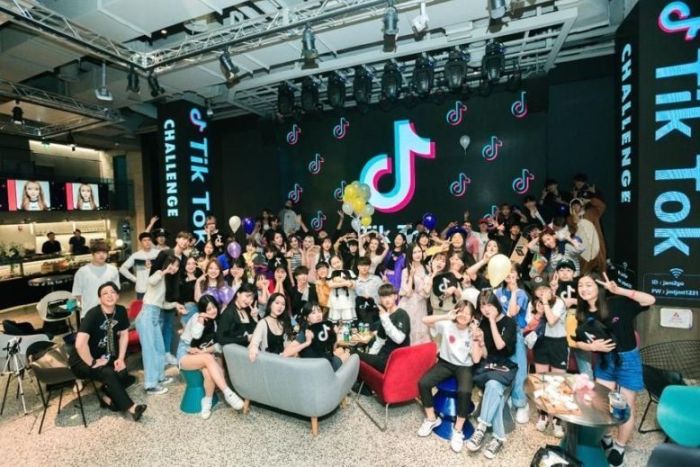
US lawmakers have proposed a ban on TikTok – the social media app known for its short viral videos – citing concerns about national security.
The bipartisan bill is the latest move in the US against the company, which is owned by Chinese tech giant ByteDance.
Last month, the head of the FBI voiced concern that China could use the app to influence users or control their electronics. Several US states have banned it from government devices.
But the bill faces long odds.
TikTok, which has more than 100 million users in the US, called the measure a “politically-motivated ban that will do nothing to advance the national security of the United States”.
The company added that it was developing plans “that we are well underway in implementing” to further secure the platform in the US as part of the national security review that began under former President Donald Trump.
“We will continue to brief members of Congress on the plans,” it said.
The political attacks on TikTok are indicative of strained relations between the US and China, said Caitlin Chin, a fellow at the Center for Strategic and International Studies, a think-tank based in Washington DC.
But she said she did not think a national ban on TikTok was likely anytime soon, noting that lawmakers have moved slowly to update US data privacy and content moderation rules despite widespread agreement that some changes are necessary.
So far, much of the concern about TikTok and China is based on the potential for abuse and not evidence of it, she added.
“From a privacy standpoint, simply preventing a company like TikTok from operating doesn’t close the gaps,” she said, noting that many other websites collect similar information.
Calls to ban TikTok have also surfaced in countries such as Australia, while Taiwan recently moved to ban it from public devices. India blocked it in 2020 amid a military dispute.
In the US, TikTok faced an effective ban two years ago following an executive order by Mr Trump barring new downloads, but judges blocked the measure and it never came into force.
It was eventually revoked by President Joe Biden.
In 2020, the Committee on Foreign Investment in the United States – charged with reviewing foreign ownership in the US – also ordered ByteDance to sell TikTok.
The company’s negotiations with that body are ongoing.
Republican Senator Marco Rubio, one of the backers of the legislation, which he said had support from at least one Democrat, argued action is overdue.
He said his bill would block and prohibit all transactions from any social media company in, or under the influence of, China, Russia, and “other foreign countries of concern”.
“This isn’t about creative videos — this is about an app that is collecting data on tens of millions of American children and adults every day,” he said.
TikTok sued by Indiana over security and safety concerns
The popular social media app TikTok has been sued by the US state of Indiana.
Its attorney general Todd Rokita has accused TikTok’s parent company ByteDance of violating the state’s consumer protections laws.
The state alleges that the app fails to safeguard young people and privacy.
However, TikTok said it considers youth well-being in its policies and that it was confident it could satisfy US national security concerns.
Indiana filed two lawsuits on Wednesday. The first one claims the app exposes young users to inappropriate content.
In the other complaint, Mr Rokita also alleges TikTok does not disclose the Chinese government’s potential to access sensitive consumer information.
“TikTok is a wolf in sheep’s clothing,” according to court documents.
“As long as TikTok is permitted to deceive and mislead Indiana consumers about the risks to their data, those consumers and their privacy are easy prey.”
The complaint says the app’s algorithm promotes a variety of inappropriate content, “depicting alcohol, tobacco, and drugs; sexual content, nudity, and suggestive themes; and intense profanity.”
It also claims that deceives young users with age ratings of 12 and above on Apple and Google app stores.
Indiana is seeking an injunction against its practices and civil penalties against the company for its “unfair and deceptive conduct.”
Mr Rokita said the lawsuits are the first launched by a US state against ByteDance.
A TikTok spokesperson said “the safety, privacy and security of our community is our top priority”.
The app has age-limiting and parental control features, the firm said, and the company is investing in further content controls.
In addition, they said TikTok was confident it could address “all reasonable US national security concerns”.
The announcement of the lawsuits come after other US states have drafted legislation to ban TikTok. Texas, South Dakota and South Carolina have prohibited the use of TikTok being used on state government devices.
Last month, the head of the FBI has said that TikTok poses a national security concern.
Its director Chris Wray told a the US House Homeland Security Committee said Chinese law essentially requires companies to “do whatever the government wants them to in terms of sharing information or serving as a tool of the Chinese government.”
The Biden administration have been in talks with TikTok officials for months as they try to reach a national security agreement to protect the data of its hundreds of millions of users in the US.
TikTok is also facing legal challenges elsewhere. In the UK, the social media company could face a £27m ($29m) fine for failing to protect children’s privacy when they are using the platform.
TikTok Now: BeReal-style feature prompts copycat claims
TikTok users have noticed a new feature promising “a whole new creative experience” – but they’ve been quick to question how new it really is.
The addition, called TikTok Now, released in the UK this week, asks users to take a photo or video from their phone’s front and back cameras at a random time of day.
TikTok has encouraged people to “share their most authentic moments”.
But many have pointed out that it looks pretty similar to BeReal.
That app, seen as an alternative to the filtered and curated feeds often associated with social media, has grown rapidly since it was launched by a small French company.
It’s currently ninth in Apple’s overall UK App Store downloads chart, compared with TikTok’s 14th place.
But it has got some catching up to do, with some reports putting its total downloads at about 27 million against TikTok’s estimated three billion.
Same but different
There are some subtle differences between TikTok’s offering and BeReal’s.
Both will send users a notification at a random time of day, after which they’ll have a limited time to snap a photo. TikTok Now also allows for 10-second videos.
BeReal prompts you with the message “It’s time to BeReal”, whereas TikTok has settled on “It’s Time to Now” for its daily countdown launch.
As for sharing your posts, BeReal is restricted by design – photos are only meant to be seen by a small circle of close friends, in line with the app’s low-key attitude.
TikTok Now offers users the ability to share their posts with the wider world, although it will be limited to friends by default.
And younger users will have automatic restrictions placed on their posts.
‘Ferociously fast’
Following TikTok’s announcement earlier this year, people were quick to point out that the concept behind TikTok Now looked very familiar.
Others were more direct, accusing it of “blatantly copying” its smaller competitor.
Tech experts leapt on the fact that Instagram had been beaten to the launch, after the company confirmed last month that it was testing Candid Challenges, its own BeReal-style feature.
And industry analyst Matt Navarra said the announcement by ByteDance, TikTok’s parent company, was “shameless and ferociously fast”.
TikTok Now and forever?
Social media companies have a track record of “borrowing” ideas from each other – with varying degrees of success.
Some features we take for granted – Twitter’s “Like” button, Instagram’s Stories and the trend for short, vertical videos – have either inspired imitators or been copied from elsewhere.
For example, Instagram recently rolled back an unpopular TikTok-style revamp that filled people’s feeds with videos.
Even celebrities like Kim Kardashian and Kylie Jenner weighed in, accusing the app of trying to imitate its rival and urging it to “make Instagram Instagram again”.
And you might remember Fleets – Twitter’s ill-fated attempt to introduce disappearing tweets similar to Instagram’s Stories features.
Or you might not. After a backlash, the company quietly retired the feature after just a few months, saying it hadn’t “seen an increase in the number of new people joining the conversation with Fleets like we hoped”.
As for TikTok Now, users in the USA got it first, with the button for the feature replacing the current Friends tab. There are plans to release it as a separate app in some countries.
It remains to be seen whether it will stick around long-term or vanish more quickly than a Vine video.

